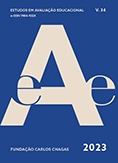Teaching and covid-19: Perceptions of educators of the paulista education network
DOI:
https://doi.org/10.18222/eae.v34.9351Keywords:
Basic Education, Pandemic, Covid-19, TeachersAbstract
The questionnaire “Education, teaching and Covid-19” was developed and made available to teachers in the São Paulo school network to investigate affective, mental health and pedagogical indicators during the pandemic. A total of 19,221 teachers participated voluntarily. The results point to fear of the pandemic and teacher insecurity regarding technology. Despite this, they say they are engaged in learning and in good mental health. A sensitive point is the perception that there is less learning in the virtual format, which is linked to issues of inequalities of access. We concluded that the impacts on education in São Paulo were relevant and the importance of further evaluations of the teaching and learning processes during the pandemic is reinforced, addressing the concept of syndemics.
Downloads
References
Almeida, R. C., Troeira, B. M. M. C., Venceslau, J. M., Branco, M. M. J., Horta, L. C. C., Brito, J. M., & Ramos, D. S. (Orgs.). (2018). Saúde emocional. Pró-Reitoria de Desenvolvimento e Gestão de Pessoal – Progesp – UFPA.
Barros, F. C., & Vieira, D. A. P. (2021). Os desafios da educação no período de pandemia. Brazilian Journal of Development, 7(1), 826-849. https://doi.org/10.34117/bjdv7n1-056 DOI: https://doi.org/10.34117/bjdv7n1-056
Centro de Inovação para a Educação Brasileira. (2020). Planejamento das secretarias de educação do Brasil para ensino remoto [slide de PowerPoint]. Cieb. https://cieb.net.br/wp-content/uploads/2020/04/CIEB-Planejamento-Secretarias-de-Educac%C3%A3o-para-Ensino-Remoto-030420.pdf
Hypolito, Á. M. (1999). Trabalho docente e profissionalização: Sonho prometido ou sonho negado? In I. P. A. Veiga, & M. I. Cunha (Orgs.), Desmistificando a profissionalização do magistério. Papirus.
Instituto Península. (2020). Sentimento e percepção dos professores brasileiros nos diferentes estágios do Coronavírus no Brasil [slide de PowerPoint]. Instituto Península. https://institutopeninsula.org.br/wp-content/uploads/2020/05/Pulso-Covid-19_-Instituto-Peni%CC%81nsula.pdf
LeDoux, J. (2007). Unconscious and conscious contributions to the emotions and cognitive aspects of emotions: A comment on Scherer’s view of what an emotion is. Social Science Information, 46(3), 395-405. https://doi.org/10.1177/05390184070460030105 DOI: https://doi.org/10.1177/05390184070460030105
Lima, A. P. T., & Pereira, M. de F. dos S. (2021). Educação x pandemia: Os desafios do ensino remoto. Brazilian Journal of Development, 7(7), 68803-68815. https://doi.org/10.34117/bjdv7n7-183 DOI: https://doi.org/10.34117/bjdv7n7-183
Nova Escola. (2020, maio). Pesquisa: A situação dos professores no Brasil durante a pandemia. Nova Escola.
Novaes, A., Pagaime, A., Artes, A., Pimenta, C., Nunes, M., & Gava, T. (2020). Informe n. 1 – Pesquisa: Educação escolar em tempos de pandemia na visão de professoras/es da Educação Básica. Fundação Carlos Chagas. https://www.fcc.org.br/fcc/educacao-pesquisa/educacao-escolar-em-tempos-de-pandemia-informe-n-1
Organisation for Economic Cooperation and Development (OECD). (2020, June 9). Education and Covid-19: Focusing on the long-term impact of school closures. OECD. https://read.oecd-ilibrary.org/view/?ref=135_135187-1piyg9kc7w&title=Education-and-COVID-19-Focusing-on-the-long-term-impact-of-school-closures
Ornell, F., Schuch, J. B., Sordi, A. O., & Kessler, F. H. P. (2020). “Pandemic fear” and Covid-19: Mental health burden and strategies. Brazilian Journal of Psychiatry, 42(3), 232-235. http://doi.org/10.1590/1516-4446-2020-0008 DOI: https://doi.org/10.1590/1516-4446-2020-0008
Reeve, J. (2006). Motivação e emoção. LTC.
Scherer, K. (2005). What are emotions? And how can they be measured? Social Science Information, 44(4), 695-729. https://doi.org/10.1177/0539018405058216 DOI: https://doi.org/10.1177/0539018405058216
Schmidt, B., Crepaldi, M. A., Bolze, S. D. A., Neiva-Silva, L., & Demenech, L. M. (2020). Saúde mental e intervenções psicológicas diante da pandemia do novo coronavírus (covid-19). Estudos de Psicologia, 37, Artigo e200063. https://doi.org/10.1590/1982-0275202037e200063 DOI: https://doi.org/10.1590/1982-0275202037e200063
Silva, I. K. de O., Morais, M. J. de O., II., & Faria, D. S. de A. (2015). O ensino de Física e sua instrumentalização por meio dos computadores: Historicidade e perspectivas futuras. Holos, 31(1), 244-252. https://doi.org/10.15628/holos.2015.1184 DOI: https://doi.org/10.15628/holos.2015.1184
Singer, M. (2009). Introduction to syndemics: A critical systems approach to public and community health. John Wiley & Sons, Inc.
Souza, S. de., Franco, V. S., & Costa, M. L. F. (2016). Educação a distância na ótica discente. Educação e Pesquisa, 42(1), 99-114. https://doi.org/10.1590/s1517-9702201603133875 DOI: https://doi.org/10.1590/s1517-9702201603133875
The Alberta Teacher’s Association. (2020). Alberta Teachers responding to Coronavirus (Covid-19): Pandemic research study initial report. Preliminary Analysis of Research Results.
Todos pela Educação. (2020). Nota técnica: Ensino a distância na educação básica frente à pandemia da covid-19. Todos pela Educação. https://www.todospelaeducacao.org.br/_uploads/_posts/425.pdf
United Nations. (2020). Policy brief: Education during Covid-19 and beyond. United Nations. https://www.un.org/development/desa/dspd/wp-content/uploads/sites/22/2020/08/sg_policy_brief_covid-19_and_education_august_2020.pdf
United Nations Educational, Scientific and Cultural Organization (Unesco). (2020). Education in a post-Covid world: Nine ideas for public action International Commission on the Futures of Education. Unesco. https://en.unesco.org/sites/default/files/education_in_a_post-covid_world-nine_ideas_for_public_action.pdf
United Nations Educational, Scientific and Cultural Organization (Unesco). (2022). Educação: Do fechamento das escolas à recuperação. Unesco. https://www.unesco.org/pt/covid-19/education-response
World Health Organization. (2014). Mental health: A state of well-being. World Health Organization. http://www.who.int/features/factfiles/mental_health/en/
Published
How to Cite
Issue
Section
License
Copyright (c) 2023 Estudos em Avaliação Educacional

This work is licensed under a Creative Commons Attribution-NonCommercial 4.0 International License.
Authors who publish in this journal agree to the following terms:
a. Authors retain the copyright and grant the journal the right to first publication, with the paper simultaneously licensed under the Creative Commons Attribution License (CC BY 4.0) license that allows the sharing of the paper with acknowledgment of authorship and initial publication in this journal.
b. Authors are authorized to assume additional contracts separately, for non-exclusive distribution of the version of the paper published in this journal (for example publishing in institutional repository or as a book chapter), with acknowledgment of authorship and initial publication in this journal.
c. Authors are allowed and encouraged to publish and distribute their paper on-line (for example in institutional repositories or on their personal page) at any moment before or during the editorial process, as this can generate productive changes, as well as increase the impact and citation of the published paper (See The Effect of Open Access).








